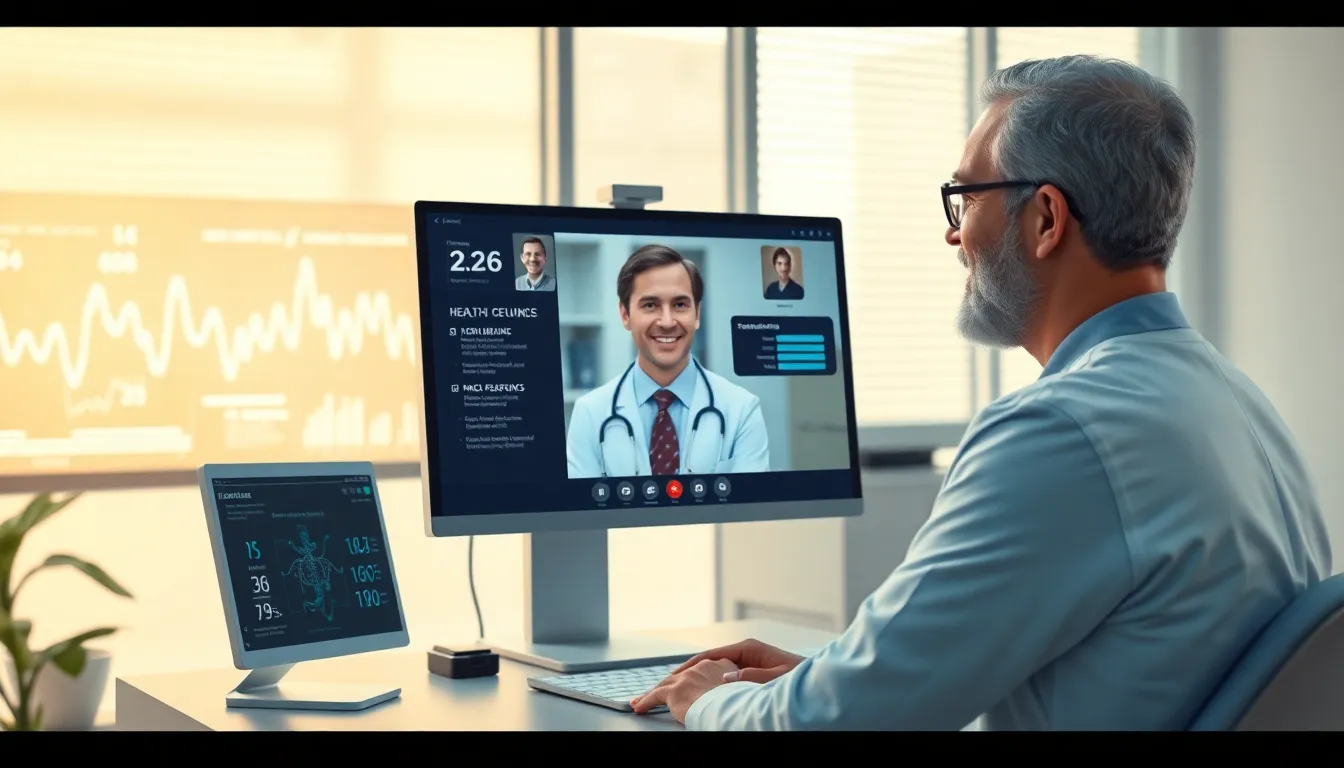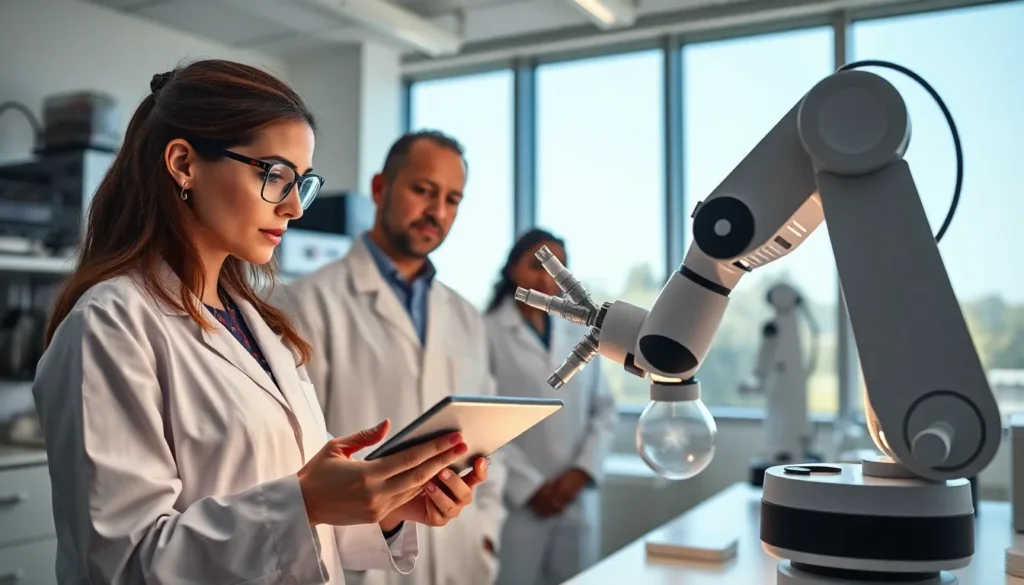Table of Contents
ToggleIn a world where science fiction often meets reality, the life sciences sector is riding a technological rollercoaster that’s both thrilling and transformative. Imagine a lab where robots handle the heavy lifting while AI crunches data faster than you can say “genetic sequencing.” It’s not just a dream—it’s happening right now.
As researchers and innovators embrace cutting-edge tools, they’re not just improving processes; they’re rewriting the rulebook on healthcare and research. From telemedicine to CRISPR, the trends emerging in life sciences are set to revolutionize how we think about health and well-being. Buckle up as we dive into the latest tech trends that are shaping the future of life sciences, because who wouldn’t want to know how tomorrow’s breakthroughs are born today?
Overview Of Technology Trends In Life Sciences
The life sciences sector experiences rapid advancements driven by technology. Robotics enhances laboratory efficiency, performing repetitive tasks with precision. Artificial intelligence analyzes data patterns, enabling faster and more accurate research outcomes.
Telemedicine transforms patient care, allowing remote consultations and monitoring. These innovations improve accessibility to healthcare services, bridging gaps for underserved populations.
CRISPR technology advances genetic editing, offering new potential for treating diseases. Researchers explore its applications in gene therapy, contributing to more personalized medicine.
Wearable devices gather health data in real-time, empowering individuals to monitor their well-being. The integration of these devices into healthcare allows for improved patient engagement in treatment plans.
Blockchain ensures secure data management in clinical trials, enhancing transparency and trustworthiness. By streamlining processes, this technology fosters collaboration among researchers and institutions.
Machine learning optimizes drug discovery, reducing development times significantly. Computational models predict molecular behavior, guiding researchers toward promising candidates for trials.
Augmented reality supports medical training, creating immersive learning experiences for students. This technology enhances understanding of complex procedures and anatomy.
By leveraging these trends, life sciences advance toward more innovative solutions. Each development offers the potential to improve health outcomes and transform the healthcare landscape.
Key Technologies Shaping Life Sciences

Technology continues to reshape the landscape of life sciences, driving innovation and improving health outcomes. Several key technologies are at the forefront of this transformation.
Artificial Intelligence And Machine Learning
Artificial Intelligence optimizes research processes through data analysis. These systems identify patterns in large datasets, enhancing accuracy in research findings. Machine Learning algorithms enable predictive modeling, which improves treatment strategies. Moreover, AI assists in drug discovery by evaluating vast chemical libraries rapidly.
Robotic process automation works alongside AI to handle repetitive tasks, freeing up researchers for critical thinking and creativity. Those advancements let healthcare professionals make informed decisions promptly, improving patient care and safety.
Genomics And Personalized Medicine
Genomics drives the shift towards personalized medicine, allowing treatments tailored to individual genetic profiles. Genetic sequencing technologies have become more affordable, enabling widespread access to genomic data. Through this information, healthcare providers identify genetic markers linked to diseases.
Personalized medicine not only enhances treatment effectiveness but also minimizes adverse reactions. The integration of genomics into healthcare encourages a proactive approach to disease prevention and management. As researchers uncover new genetic insights, healthcare practices continue to evolve, delivering highly specific interventions for patients.
Telemedicine And Remote Patient Monitoring
Telemedicine enhances access to healthcare by allowing patients to consult with providers remotely. This technology extends care to underserved populations, eliminating geographic barriers. Remote patient monitoring tools enable healthcare professionals to track patients’ real-time health data.
Wearable devices play a significant role in this space by providing continuous health metrics. Both care providers and patients benefit from immediate insights into conditions, leading to quicker interventions. Telemedicine’s convenience changes the landscape of healthcare delivery, promoting better patient engagement and adherence to treatment protocols.
Impact On Research And Development
Technology trends in life sciences significantly enhance research and development efforts. Innovations in artificial intelligence and machine learning play crucial roles in streamlining processes.
Accelerated Drug Discovery
AI and machine learning algorithms transform the drug discovery landscape. These technologies analyze vast datasets efficiently, identifying potential drug candidates quicker than traditional methods. Data-driven insights lead researchers to optimize compounds, reducing time spent on trial and error. Clinical research organizations actively employ these advancements to expedite the development of therapies. Some companies report up to a 30% reduction in time for bringing new drugs to market, allowing for faster patient access to life-saving treatments.
Clinical Trials And Data Management
Clinical trials benefit immensely from technology trends, enhancing data management practices. Blockchain applications improve data integrity and transparency, fostering collaboration among researchers. Real-time data sharing across platforms enhances patient recruitment and engagement. Using wearable devices and mobile apps allows real-time monitoring of participants’ health, yielding more accurate clinical insights. Ultimately, these innovations significantly decrease the time and costs associated with clinical trials, leading to more efficient and effective research outcomes in the life sciences sector.
Challenges And Considerations
The integration of technology in life sciences brings various challenges that require attention. These challenges span data privacy and security, regulatory compliance, and the continuous need for updates in best practices.
Data Privacy And Security
Data privacy and security remain critical concerns in life sciences. Organizations handle sensitive patient information, making robust protection necessary. Ensuring compliance with regulations like HIPAA is crucial for maintaining patient trust. Cyberattacks on healthcare data systems have increased, highlighting the need for fortified security measures. Implementing encryption and access controls reduces vulnerabilities significantly. Regular audits can help identify weaknesses in security protocols, ensuring the ongoing protection of data.
Regulatory Compliance
Regulatory compliance represents a fundamental challenge for tech integration in life sciences. Navigating complex regulations from agencies such as the FDA requires diligence. Changes in technology can outpace regulatory frameworks, creating gaps in compliance. Organizations must engage in proactive communication with regulatory bodies to stay informed of updates. Documenting processes and utilizing compliance management systems promotes adherence to current regulations. Training staff on compliance requirements helps mitigate risks and encourages a culture of accountability within organizations.
Future Directions In Life Sciences Technology
Emerging technologies are setting new directions for life sciences. Advanced robotics now assists in laboratory settings by automating tasks, significantly increasing productivity. Artificial intelligence enhances data interpretation by identifying complex patterns, streamlining research outcomes. Telemedicine continues evolving, providing remote health consultations that expand access for patients everywhere. CRISPR’s role in genetic editing grows, paving the way for innovative disease treatments and specialized healthcare strategies.
Wearable health devices increasingly enable real-time patient monitoring. These tools collect vital information to support individuals in managing their well-being. Blockchain enhances transparency and data security in clinical trial management, giving researchers confidence in collaboration efforts. Machine learning improves drug development processes by analyzing extensive datasets rapidly, decreasing the time needed to bring new medications to market.
Augmented reality supports medical education, offering students immersive simulations that deepen understanding of anatomical and physiological concepts. Innovations in genomics promote personalized medicine, tailoring therapies based on a patient’s unique genetic makeup. Collaboration among researchers through data-sharing platforms drives a faster pace of discovery across the life sciences.
Despite these advancements, challenges remain. Data privacy issues around sensitive information require rigorous protection measures to uphold patient trust. Regulatory compliance continues to be vital as organizations navigate complex health regulations designed to safeguard patient care. Staff training on these evolving standards is essential, fostering a culture of compliance that promotes accountability.
Channels for innovation are opening in the life sciences sector, driven by technology’s transformative power and the commitment to addressing existing challenges. Adapting to these changes ensures significant strides in improving health outcomes and reshaping the healthcare landscape.
The life sciences sector stands on the brink of a technological revolution. As advancements like AI robotics and telemedicine reshape research and patient care, the potential for improved health outcomes is immense. With innovations in genomics and CRISPR paving the way for personalized medicine, the future looks promising.
However the challenges of data privacy regulatory compliance and the need for continuous adaptation cannot be overlooked. Addressing these issues is crucial for maintaining trust and ensuring the responsible use of technology. By embracing these trends and navigating their complexities the life sciences industry is poised to unlock new possibilities that will ultimately enhance healthcare for everyone.







